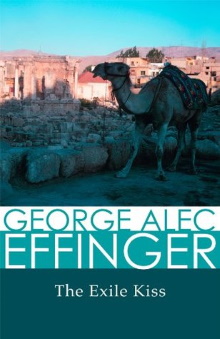
Finally we come to the third and last book of George Alec Effinger’s Budayeen series featuring protagonist Marîd Audran. Everyone who has reviewed this talks about how the title is lifted from Shakespeare but I was delighted to discover that its opening quote is a Malay proverb even if I’ve never heard of it before. I think it’s a good sign of how widely this American writer roamed in search of inspiration.
Wealthy, powerful and now more alike to his patron Friedlander Bey than ever in terms of dress and mannerisms, Marîd Audran has come from his street hustler days. He is also married to Indihar, the widow of his police partner in the previous one, thought it remains unconsummated. Wealth and power however fail to protect him and Bey being caught up in a plot masterminded by Reda Abu Adil, Bey’s rival for influence in the Budayeen. After attending a dinner in which the amir of the city tries to broker peace between the two factions, Bey and Audran is accused of murdering a police officer and immediately sent into exile. They are captured, roughed up and transported to the Empty Quarter of the Arabian Peninsula where they are left to die. Fortunately Bey proves to have some experience in the deep desert and so they work together to survive and make their way back to enact their vengeance.
Continuing the pattern established in the previous book, the farther Marîd Audran gets from the street, the more the science-fiction elements of the setting take a back seat to the cultural milieu. He abuses his cybernetic implants to ignore thirst, hunger and fatigue in the desert but that’s pretty much it as he seems to be serious about trying to cut down on using the implants and the drugs. I’m fine with that however as the exotic experiences Audran has in the desert are so fantastic and well written. They are rescued by a friendly Bedouin tribe and large parts of the book are about him learning their ways and becoming partly Bedouin in the process. Audran even helps the chief of the tribe with a murder and later uses the same methods to try to clear his name when he gets back. I suspect that true experts may find mistakes in Effinger’s descriptions of the Bedouins’ culture and way of life but it all reads great to me. I love the wealth of detail on the various ways to survive in the desert and how the Bedouins combine practicality and adherence to the Islamic faith. Their exile is by far the best part of the novel.
Unfortunately while Effinger knew exactly what he wanted to put Audran through in the desert, once he gets back he just goes back to mostly to faffing around in an unsatisfactory way. The book does arrive at an ending but it’s so abrupt that I honestly couldn’t believe that’s all there is to it. I mean what kind of noir has the villain be exactly who you think it is right from the beginning? We never even really find out why the police officer was killed in the first place. What’s worse is that all of the subplots are just dropped and go nowhere. There’s no resolution between Audran and his marriage to Indihar, nor to his relationship with his girlfriend Yasmin. We know that Audran’s mother is now staying in Bey’s house but we never get so much as a scene with her. It feels like Effinger didn’t quite have the time to finish the book and so just phoned it in. I know that he planned at least one more book but died after finishing only just two chapters. In any case this is a terrible ending to what is otherwise a pretty solid book.
This means that it’s a mixed bag really. I liked sharing in Audran’s mindset and enjoyed reading about the desert. But as before, large parts of the worldbuilding remain unconvincing to me, such as how someone as supposedly powerful and wealthy as Bey could go around with so little security that he is so easily kidnapped. Stuff like Audran getting a following of street kids sounds cool but it’s just one thing that comes out of nowhere and feels unrealistic. For a gritty neighborhood that is supposedly crime-ridden, this book does actually make the Budayeen sound like just your average tourist trap. It’s enjoyable enough as a novel but it has too many flaws to be truly called good.